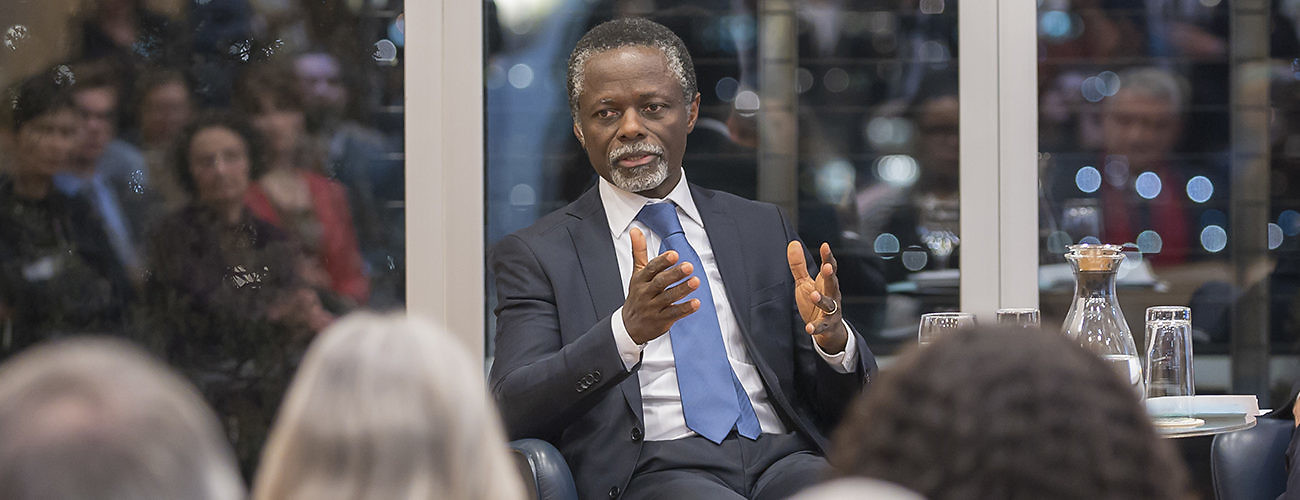Just weeks after the signing of a new peace agreement between the government of the Central African Republic (CAR) and 14 armed groups, the top United Nations official there came to IPI on February 26th and spoke of the diplomatic accomplishment and the continuing challenges of consolidating it.
“It is not often that the Central African Republic is the subject of good news, and good news came on February 6th,” said Parfait Onanga-Anyanga, the Special Representative of the UN Secretary-General (SRSG) for CAR and the head of the UN Multidimensional Integrated Stabilization Mission there (MINUSCA). February 6th was the day the peace accord between the government and the 14 armed groups was signed in Bangui, the country’s capital.
CAR is a country that has been ravaged by war and victimized by ten failed peace efforts, and Mr. Onanga said, “For those who have been following CAR for a long time, it’s almost natural to be skeptical and to wonder why this new agreement will be seen as a breakthrough.” The challenge now, he said, is “how a country that is fragmented can learn to live together.”
Among the reasons he said he felt this stabilization effort might succeed where others had failed were that CAR, though a “weak state”, was now one “with democratic institutions”, that armed groups were not challenging the legitimacy of the accord, that the state was demilitarized, with no army of its own, and that “the entire international community is joining hands and embracing the process.”
The UN, in partnership with the African Union, played a major role in helping the parties reach agreement and will be a key player going forward, overcoming obstacles, and consolidating the peace, he said. “Thanks to peacekeeping, a force for good, CAR has been kept together. We have contained the worst of humanity, and we have been able to ensure that this country works slowly, but maybe surely, to a better future… nothing should be done to undermine peacekeeping.”
Peacekeeping missions are there “to create a conducive environment for dialogue,” he said. “It is a political tool, peacekeeping is not meant to be fighting a war… but at the same time I’ve made it very clear there will be no political solution that would be a sustainable solution without a sizable amount of legitimate force.” The mission in CAR was handicapped, however, by not having enough soldiers trained in peacekeeping and the protection of civilians, and by an overall lack of funding, he said. “We need to invest more today so that tomorrow we may be able to envision some kind of an exit strategy in which Central Africans take on the brunt of responsibilities in their own nation.”
CAR is one of Africa’s poorest countries, where a quarter of the 4.5 million people have fled their homes because of the continuing unrest. Some 600,000 of them are internally displaced, Mr. Onanga said, and “they have lost everything, they really are destitute. Their only hope is to find a UN peacekeeping outfit somewhere and to build their lives around that base.” Particularly affected, he said, were young people. “There are no real solutions for youth, they fall prey to criminal organizations just for survival.”
He said that 70 percent of the violence in the country has nothing to do with a “political agenda, it’s simply criminality.” The politically inspired conflicts were driven by competition over who controls wealth, he said, and for that reason, armed groups tended to be present in mineral-rich areas.
In much of the country, there is little presence of the state, and this poses a real threat to stability. “What we usually hear from those armed groups is that, ‘We took up weapons because our region was neglected.’”
Mr. Onanga was to end his four years of service for the UN in CAR two days after the event, and he said with some satisfaction that “thanks to the UN, we have protected this country from really going into chaos.” He said the UN’s mission now was to help produce a “fully inclusive process that will go beyond the peace agreement to offer the people of CAR an opportunity to address together in a non-violent way their grievances and give the country a chance to really do what has never happened before, to see how they can build their social contract.”
The discussion with Mr. Onanga was part of IPI’s “Leading for Peace: Voices from the Field” series, and the moderator was Jake Sherman, Director of IPI’s Brian Urquhart Center for Peace Operations.








